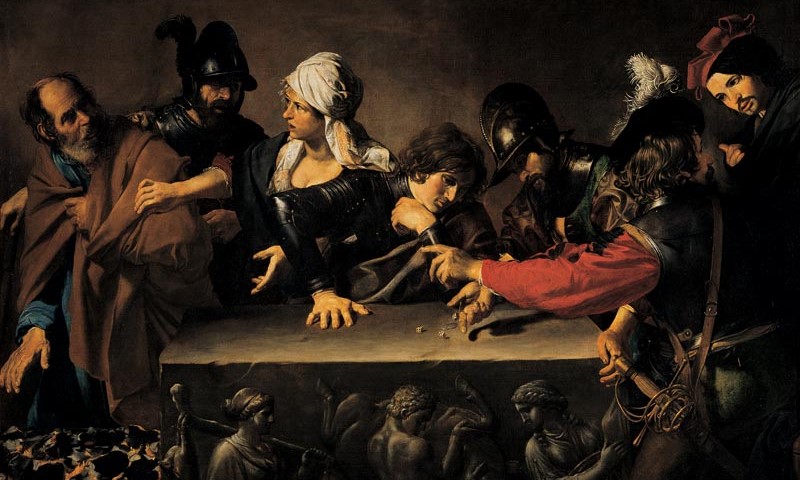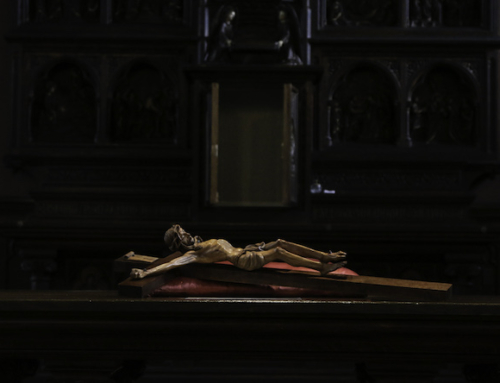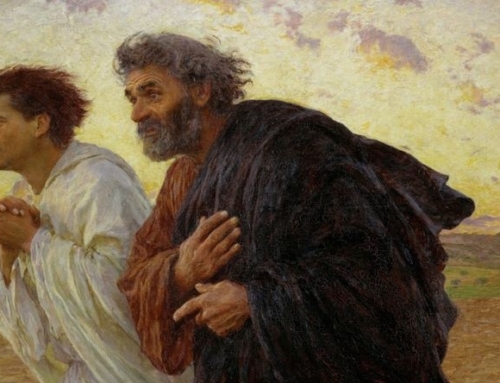The Catholic Friday should be different than the world’s Friday. In fact, the Catholic weekend should be different. Friday, Saturday, and Sunday are to be red, blue, and white days—not because of patriotism, but because of the Passion, the Fiat, and the Empty Tomb. The mysteries of the Rosary upon which we mediate each of these days also reflects this triple character: Friday prompts us to ponder the sorrowful mysteries; Saturday, the joyful; and Sunday, the glorious. Rightly, the weekend ought to remind the Christian that discipleship entails the heaviness of the cross, the help of grace, and the hope of eternal life. Every weekend should be a little Triduum.
In special seasons, the three-note weekend chord can shift in key. In Advent, as we turn with expectation to Our Lady, every day seems to sound like a Saturday suspended chord. Throughout Easter, a series of major chords result from a progression of Sunday celebrations: Resurrection, Divine Mercy, Jubilate, Good Shepherd, Pentecost. In Lent, a clear focus on Fridays sets up a 40-day score set to a minor key that eventually gives way to the sheer silence of the Friday that is Good.
The Catholic Friday is always penitential because of Good Friday. But that looks different depending on which Friday it is. The year looks something like this in the United States:
- During the whole year, Catholics are urged to observe practices of penance on Fridays (abstinence from meat is given “first place” among recommended penances).
- During Lent, Catholics 14 years and older are to abstain from eating meat on Fridays.
- On Good Friday, Catholics 14 years and older are to abstain from eating meat and Catholics 18 years and older, until they turn 59, are to fast.
Whether we are in Lent or not, Friday is always to be a “special day of penitential observance” for the Catholic. The United States bishops teach that “Friday should be in each week something of what Lent is in the entire year” (“Pastoral Statement on Penance and Abstinence,” 23). What changes, however, is the degree to which we as Catholics unite in doing penance as we near the Good Friday of the Lord’s Passion. Together, we gradually enter more deeply into the mystery of Christ’s sufferings.
The Catholic says, “Thank God it’s Friday,” because salvation was wrought on a Friday. Out of love, Jesus Christ—the Word Incarnate, true God and true man—embraced death and suffering, transforming them into the means by which the wounds of sin are healed and man is led to eternal life with God. When we do penance on Fridays, we recall this unfathomable gift. We express sorrow for our own personal sins as well as those of all the world. We unite our own sufferings to those of Christ, asking that they too might become salvific. We take up our cross and follow him.
The Catholic Friday should be different than the world’s Friday. The Roman guards drank and gambled on Good Friday (Mark 15:23-24; Ps 22:18). Peter kept comfortable by the fire (Mark 14:54). The penitential witness came from Mary and John at Calvary’s height (John 19:25-27). A Catholic Friday entails joining in this Marian and Johannine witness. And lest we forget, the Catholic Friday leads to the glory of the Catholic Sunday. But more on that in about five weeks …
✠
Image: Valentin de Boulogne, Denial of Saint Peter







